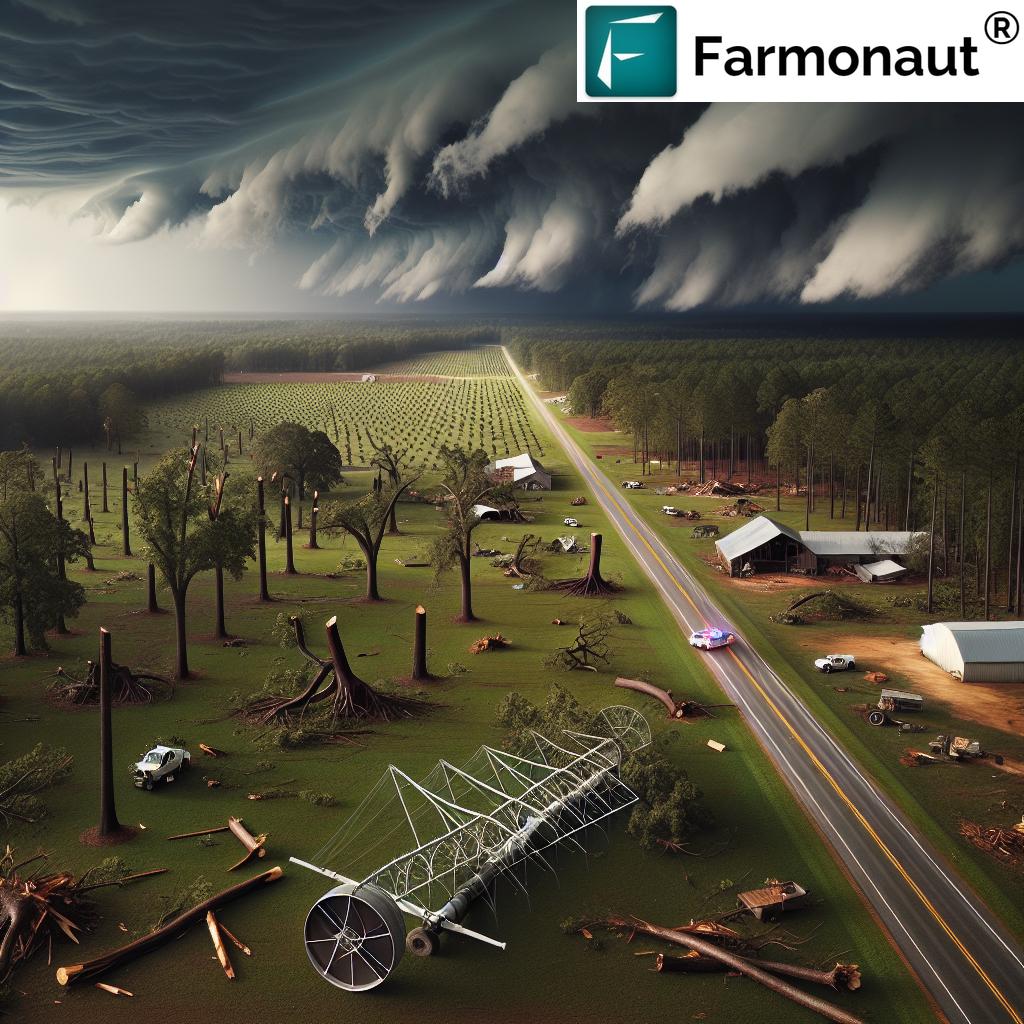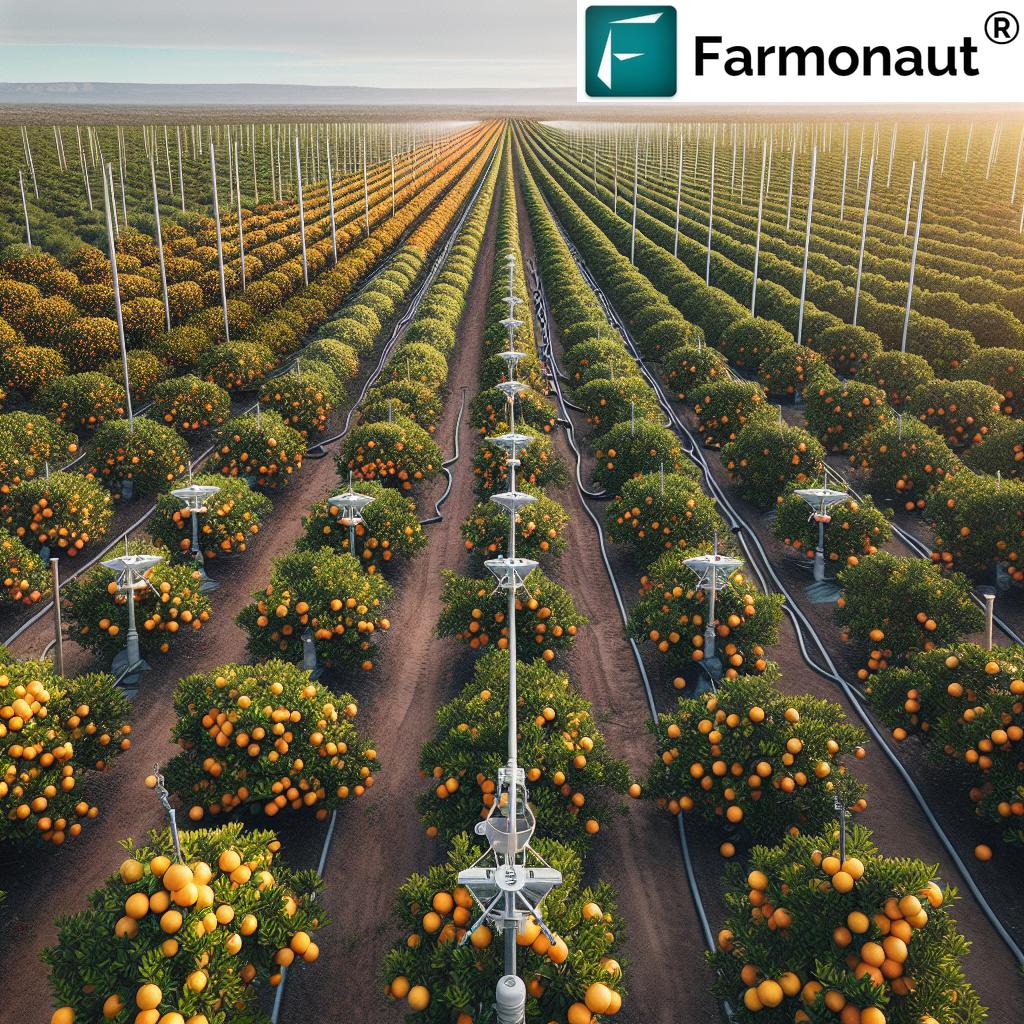Tennessee Farmland for Sale: 2025 Investment & Trends
Table of Contents
- Tennessee Farmland Investment: A Growing Opportunity in 2025
- Trivia: Farmland Value Growth
- Agricultural Landscape of Tennessee in 2025
- Farmland for Sale in Tennessee: Market Dynamics
- Tennessee Farmland Investment Overview Table
- Strategic Advantages of Tennessee Farmland Investment
- Extension Services & Innovation in Tennessee Agriculture
- Tennessee Farmland Investment Trends for 2025
- 2025 Buyer’s Guide: Making Informed Farmland Investment Decisions
- Farmonaut: Satellite Technology for Smarter Farmland Investment
- Farmland for Sale Tennessee: Outlook for 2025 and Beyond
- Frequently Asked Questions
Tennessee Farmland Investment: A Growing Opportunity in 2025
In 2025, tennessee continues to emerge as an exceptionally attractive state for farmland investment, bolstered by its favorable climate, diverse agricultural outputs, and a central location connecting multiple key markets. Agriculture remains a cornerstone of the Tennessee economy, contributing billions of dollars annually and supporting thousands of jobs across its rural communities. Both investors and farmers are seeking a nuanced understanding of current tennessee farming trends, farmland for sale tennessee, and the sector’s evolving investment potential as they look to make informed decisions in this dynamic market.
Agricultural Landscape of Tennessee in 2025
Agriculture in Tennessee benefits from a temperate climate and long growing seasons, as well as fertile soils across varied geographies. The state produces a broad range of crops and supports extensive livestock operations. This array of agricultural outputs positions Tennessee farmland investment as both resilient and adaptable for the coming years.
Key Regions & Soil Types
- Mississippi Delta (West Tennessee): Ultra-fertile soils, ideal for row crops like cotton, corn, and soybeans.
- Middle Tennessee Rolling Hills: Productive hayfields, pastureland for cattle, and emerging specialty crops.
- Eastern Highland Rim & Appalachian Foothills: Suited to diverse crop production, nursery products, and organic farming.
Tennessee boasts a strategic mix of large commercial farms and smaller family operations, creating a rich tapestry united by innovation and a commitment to sustainable practices. Advances in precision farming, diversification, and climate-smart agriculture are helping farmers increase yields while preserving the rural way of life across the state.
Top Crops and Livestock in Tennessee (2025)
- Cotton, Soybeans, Corn, Tobacco, Hay
- Specialty Crops: Hemp, Organic Vegetables, Nursery Plants
- Livestock: Substantial cattle and poultry production
The sector’s diverse outputs continually gain momentum, positioning tennessee as an emerging agricultural hub for investors seeking robust farmland for sale tennessee opportunities.
Farmland for Sale in Tennessee: Market Dynamics & 2025 Forecast
Demand for farmland in Tennessee remains robust into 2025, reflecting a blend of local farmers expanding operations and outside investors entering the market to capitalize on tennessee’s value proposition. Each region offers unique opportunities:
- West Tennessee (Mississippi Delta): Largest tracts, high-value row crop ground, typically command higher prices but offer exceptional production potential.
- Middle Tennessee: Broad mix of hay, pasture, and diversified crop farms; moderate prices, high demand, and growth in specialty/niche farming.
- Eastern Tennessee: Rolling foothills, smaller parcels, increasing focus on organic and nursery production.
Farmland for sale tennessee presents a spectrum of properties tailored for diverse cropping systems, livestock operations, and sustainable practices. The relative affordability compared to neighboring states like Kentucky or national averages remains a key draw—especially as prices have increased due to growing demand but generally stay within reach for both seasoned operators and newer entrants.
Both state and federal programs continue supporting farmland acquisition and conservation, offering financial incentives and technical assistance for new buyers in the market.
Essential Considerations When Evaluating Tennessee Farmland
- Soil quality and type
- Topography and ease of mechanization
- Reliable water access (irrigation, rainfall patterns)
- Proximity to transportation corridors and urban markets
- Existing farm infrastructure (barns, fencing, irrigation systems, outbuildings)
- Zoning and land use regulations
- Availability of extension and technical support
The current market dynamics suggest that farmland for sale tennessee will remain an appealing option for informed investors throughout 2025 and beyond.
Tennessee Farmland Investment Overview Table
Below, we present a comparative overview of high-potential regions in tennessee for farmland investment in 2025. Use this data as a foundation for your research and strategic planning.
| Region/County | Avg. Farmland Price/ Acre (Est., 2025) | Top Crops Grown | Est. ROI (%) | Key Market Trends | Notable Investment Opportunities |
|---|---|---|---|---|---|
| Shelby County (West TN) | $7,400 | Soybeans, Cotton, Corn | 7.2 | Rising export demand; irrigation expansion | Large row crop tracts, irrigated properties |
| Obion County (Northwest TN) | $6,850 | Corn, Soybeans, Wheat | 6.8 | Increasing cash rent; crop diversification | High-yield corn/soy farms; rental income |
| Madison County (Central West TN) | $6,500 | Cotton, Soybeans, Hay | 6.3 | Sustained crop prices; stable land sales | Cotton-intensive and mixed use farms |
| Davidson County (Middle TN) | $12,800 | Hay, Specialty Vegetables, Nursery | 5.8 | Urban expansion; high demand for greenbelt land | Specialty crops; organic & agritourism |
| Rutherford County (Middle TN) | $8,950 | Hay, Corn, Beef Cattle | 6.1 | Poultry/livestock expansion; robust hay markets | Pastureland, cattle operations, poultry houses |
| Hamilton County (Southeast TN) | $10,200 | Nursery, Organic, Vegetables | 6.0 | Strong organic market growth; horticulture boom | Nursery stock, greenhouse enterprises |
| Greene County (East TN) | $6,200 | Corn, Hay, Dairy | 5.7 | Diversification; small farm resurgence | Dairy, organic and small-acreage specialties |
Strategic Advantages of Tennessee Farmland Investment in 2025
Investing in tennessee farmland in 2025 brings a unique blend of financial, operational, and strategic benefits:
-
Central Geographic Location
Tennessee sits at the crossroads of the Southeast, with major transportation corridors (including I-24, I-40, and the Mississippi river network). This promotes fast, cost-effective distribution of crops and livestock products to major consumer markets throughout the South, Midwest, and beyond. -
Favorable Climate & Fertile Soils
The state’s temperate climate, ample rainfall, and broad range of soils create exceptional conditions for high-yield production. Whether it’s staple crops or specialty vegetables, the baseline productivity remains an investor draw. -
Economic Stability & Income Generation
Land values in Tennessee have consistently appreciated, providing a hedge against inflation. Coupled with steady farm income from crop and livestock operations, farmland investment tennessee offers stable, long-term returns—even amid wider financial market volatility. -
Sustained Demand & Crop Diversification
Diversification is a hallmark of Tennessee’s agricultural scene—soy, corn, cotton, tobacco, and new specialty crops all benefit from solid domestic and global demand. This reduces risk for investors compared to single-crop dependency. -
Institutional Support and Innovation
The University of Tennessee Extension provides critical support in adopting modern, sustainable farming practices, new crop varieties, and resource use efficiency. This empowers farmers to stay competitive and resilient. -
Progressive Water & Land Stewardship
Awareness of resource management is rising across the state. Adopting sustainable practices—monitored with the latest tech and tools—enhances long-term land value and marketability.
A growing number of buyers are recognizing these advantages, making informed investment decisions in line with evolving trends across tennessee farming.
Extension Services & Innovation Supporting Tennessee Farming
A major strength of agriculture in tennessee lies in its robust network of public and private support systems. The University of Tennessee Extension is a leading resource, helping farmers implement best practices in:
- Precision agriculture & yield optimization
- Data-driven management & record keeping
- Adoption of new crop varieties and specialty products
- Sustainable irrigation & water conservation
- Pest and disease management strategies
For new investors, access to such resources is invaluable—not only for operational productivity, but also for environmental stewardship and risk management amid changing climate patterns.
For landowners seeking advanced monitoring and resource optimization at scale, explore our Large Scale Farm Management solution, which harnesses satellite insights and AI for field-level decision-making and efficiency improvement.
Tennessee Farmland Investment Trends for 2025
Several trends are shaping the 2025 landscape for tennessee farmland investment, making it one of the top states for new and seasoned investors alike:
- Shift to Specialty and Organic Crops: Increased consumer demand for locally grown, organic produce is boosting specialty market opportunities, particularly in Middle and Eastern Tennessee.
- Growing Interest in Carbon Footprinting & Sustainability: There’s heightened focus on climate-smart agriculture (learn about carbon footprint monitoring here) and regulatory compliance, especially among institutional and ESG-conscious investors.
- Integration of Precision Tech: Adoption of satellite monitoring and AI-driven tools enhances yield and resource management, lowering operational risks on Tennessee farms.
- Steady Appreciation of Land Values: Land values have risen sharply post-2022, and all indicators suggest continued growth for the next several years.
- Emergence of Blockchain for Traceability: Verification and transparency in Nashville’s food supply chains is a rising priority—making blockchain-based traceability solutions especially appealing for local agricultural enterprises and their buyers.
- Financial Ecosystem Support: Easier access to bank loans and insurance, including satellite-verified crop loan eligibility, gives both new and established farm businesses greater security and flexibility.
These factors signal a maturing, robust, and increasingly diversified market—meaning 2025 is primed for well-researched farmland investments.
Access advanced satellite monitoring, operational analytics, and real-time insights for your farmland in Tennessee with the Farmonaut Web App and Mobile Apps.
If your operations require efficient logistics, route planning, and machinery tracking, our Fleet Management solution helps minimize costs and ensure resource efficiency for large and mid-scale Tennessee farms.
For plantation, forestry, and crop-specific advisory powered by satellite data and AI, read about our Crop Plantation & Forest Advisory system and see how it can support your sustainability and productivity goals.
2025 Buyer’s Guide: Making Informed Farmland Investment Decisions
To maximize opportunities and ensure resilient returns in the tennessee farming market, buyers in 2025 should:
-
Define Investment Objectives and Criteria
Are you targeting grain/row crop income, specialty organics, livestock, or land appreciation? Clarify your risk tolerance, desired ROI, and operational involvement (active vs. passive). -
Assess Land Potential Thoroughly
Study soil maps, rainfall patterns, water access, farm infrastructure, and previous yields. Satellite and AI-based analytics, like those provided by Farmonaut, support quick, data-driven property assessments for both large and small tracts. -
Understand Ownership Costs & Potential Returns
Consider ongoing expenses (taxes, insurance, maintenance, infrastructure upgrades) versus projected crop/livestock revenue or rental income. -
Consider Operational Partnerships
Joint ventures with local farmers or ag professionals can help enhance returns, manage risk, and build expertise specific to Tennessee’s markets and climate. -
Stay Informed on Zoning and Policy Trends
Zoning can affect allowable uses. Conservation easements and greenbelt designations may also present advantages or restrictions for farmland for sale tennessee. -
Utilize Modern Technology
Leverage solutions such as satellite technology, crop monitoring, and digital record keeping to stay efficient and sustainable.
Tip: Harness Farmonaut’s Satellite API or explore our API Developer Docs to integrate real-time field insights and automate due diligence directly into your acquisition pipeline. This is invaluable for institutional buyers and family offices assessing multiple properties across Tennessee.
Farmonaut: Satellite Technology for Smarter Farmland Investment
We at Farmonaut recognize that sound decision-making in the modern tennessee farmland investment landscape hinges on data, accuracy, and adaptability. Our platform offers affordable, scalable satellite-based solutions designed for both individual farmers and large enterprises, transforming how you monitor, analyze, and maximize your farmland’s potential in 2025 and beyond.
Key Capabilities for Tennessee Landowners and Investors
- Satellite-Based Monitoring: Monitor crop health, soil conditions, and even water usage across vast or small properties in real-time—supporting quick interventions and data-driven management.
- AI Advisory System: Receive tailored, localized recommendations for planting, fertilization, irrigation, and pest management—helping boost yields and minimize input waste.
- Blockchain Traceability: Enable transparency in your supply chain, building trust with buyers and consumers—an emerging value driver for Tennessee specialty crop producers (read more here).
- Resource Management & Fleet Tracking: Optimize logistics and reduce operational costs with our comprehensive tools for vehicle and equipment monitoring.
(Fleet Management Features) - Environmental Impact Tracking: Monitor and reduce your carbon footprint, aligning with regulations and adding value for ESG-oriented businesses (explore carbon monitoring).
These capabilities not only support profitability but also help Tennessee landowners comply with emerging environmental and market requirements, ensuring a future-ready approach to agricultural investment.
Farmland for Sale Tennessee: Outlook for 2025 and Beyond
Looking ahead, the future of tennessee farmland investment is bright. Technological advancements, an evolving consumer landscape, and the state’s favorable geographic position provide a solid foundation for continued growth. Those prioritizing sustainable practices, resource efficiency, and environmental stewardship will find themselves especially well-positioned for stable returns and market expansion.
As available farmland for sale tennessee remains in high demand, due diligence and reliance on modern data-driven tools (such as satellite monitoring, fintech-backed verification, and AI-based advisory systems) will be essential for buyers seeking lasting success. The 2025 market will reward those who blend tradition with innovation—preserving Tennessee’s agricultural heritage while pursuing informed, profitable investments.
FAQs: Tennessee Farmland Investment in 2025
What is the average ROI for Tennessee farmland in 2025?
Depending on region and crop mix, estimated ROI for tennessee farmland in 2025 ranges between 5.7% and 7.2% for well-managed operations. Returns are robust for both row crops and diversified specialty systems due to rising demand and stable land values.
Are there affordable regions for small and medium-sized farmland buyers in Tennessee?
Yes, Northwest and parts of East Tennessee (e.g., Obion, Greene Counties) offer moderate price points for high-quality land, making them attractive for smaller investors or operators entering the market.
Which crops are considered strategic focus areas for 2025?
Cotton and soybeans continue to dominate acreage and drive investment, but specialty crops (organic vegetables, nursery, hemp) are rapidly expanding, particularly in Middle and East Tennessee.
What environmental monitoring options are available for Tennessee farmland?
Tools like Farmonaut’s satellite-driven solutions offer real-time monitoring of crop health, soil conditions, water usage, and environmental impact (including carbon footprint and resource use). Visit our carbon footprinting product page for more details.
Can satellite technology help with due diligence for farmland purchases?
Absolutely. Satellite imagery can provide 3-5 year vegetation health history, identify water access issues, and detect infrastructure before site visits, greatly improving the buyer’s research and reducing risk.
How do I get started with Farmonaut’s tools?
You can access our satellite monitoring, field analytics, and advisory services through the Farmonaut web and mobile apps, or build custom workflows via our API interface.
Conclusion: Tennessee’s Evolving Farmland Investment Landscape
Tennessee’s strategic location, robust agricultural sector, and supportive policy ecosystem make it a stand-out destination for farmland investment in 2025. The state offers a balance of tradition and innovation, diverse crop and livestock opportunities, and access to modern analytics and satellite-driven decision tools. For the savvy investor, tennessee farming is more than just a land play—it’s a strategic move in a state that continues to set the pace for agriculture in the Southeastern U.S. and beyond.
Begin your data-driven Tennessee farmland investment journey today:
For advanced analytics, field management, and satellite monitoring to enhance your investments, get started with Farmonaut today.














